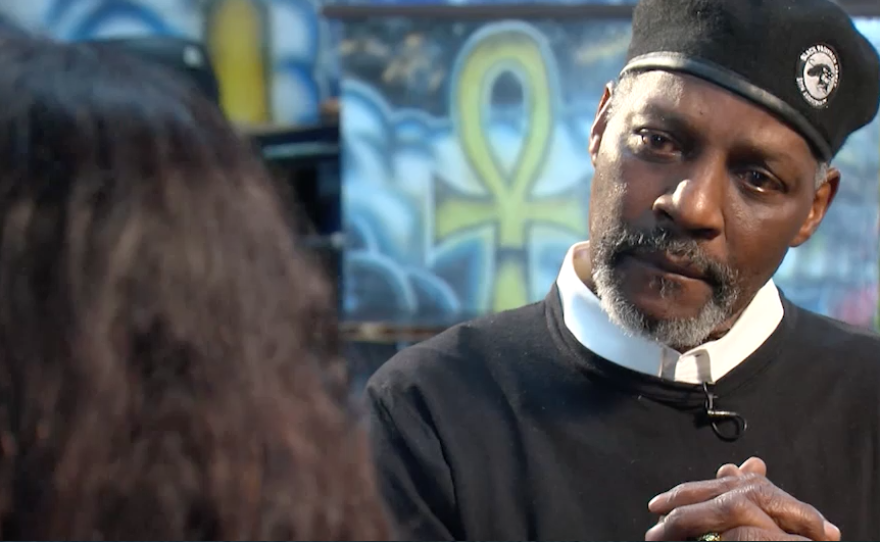Trunnell Price, one of the founders of the San Diego Black Panther Party who went on to become the local group’s information and education minister, died Jan. 26 in San Diego. He was 72.
His wife Michele Price said the cause was complications from chronic obstructive pulmonary disease.
Price became a key figure in the San Diego Black Panther movement by teaching members about the group’s 10-point strategy to educate, employ, house Black people and ensure that the government treated them fairly.
In a 2017 interview with KPBS, Price described the harsh realities facing residents of predominantly Black Southeastern San Diego neighborhoods in the 1950s and 60s, especially when they had run-ins with the police.
”If we were accosted by the San Diego Police Department for whatever reason, pick one, we were usually taken down by Father Joe’s at the lumber yard and we were brutalized,” Price said. “We were beaten or talked down to or cussed out.”
With fierce eyes and a strong voice, Price described with precision what it meant to be Black or Brown during a time when the city’s racial fault lines ran deep.
“San Diego was a conservative city and most people outside of the Black community did not want any interaction with the people in Southeastern San Diego, the people in Logan Heights,” Price said.
The city’s racial borders might have been unmarked, but he said most people of color back then still understood where they were.
“I think the boundary from Logan Heights and Southeastern San Diego was probably Balboa Park,” Price said. “And that’s pushing it. Everything else was basically off limits … you were harassed by the police who would tell you to, `Get out of here. Go back where you came from.'”
RELATED: History Of San Diego's Black Panther Party Marked By Social Work And Police Clashes
Price wore the trademark Black Panther beret almost as a second skin. It represented an antidote to what he had witnessed and lived, some of it a paradox in the late 1960s.
Southeastern San Diego was in the midst of a cultural revival in music, dress and thought similar to Black communities in Detroit, Chicago and Harlem. But Price said there was a flip side.
“At the time, there was a lot of social unrest, a lot of disappointment in the Black neighborhoods and Black communities throughout the United States,” Price said. “San Diego was not any different. We were also suffering from a lot of social, economic and political inequalities.”

Conditions were ripe for activism in 1967, when leaders at the Black Panthers’ national headquarters in Oakland reached out to the Black Student Union at San Diego State University. They wanted students to establish a local chapter. Price and others jumped at the chance.
“I was immediately attracted to it because it allowed me to help the Black community,” Price said.
Price said the local Black Panthers provided meals for the elderly, opened up community health clinics and served food to the homeless. And they started a breakfast program for children.
“We were more excited than the people because we were fulfilling our obligation,” Price said.
Fellow San Diego Black Panther Henry Wallace met Price when the local party formed.
“He was studious,” Wallace said of Price. “He was always a square type of guy. He was so serious, so serious about learning about our people and our place. There was so much dignity. It’s hard to believe he is gone.”
RELATED: Trump Presidency Inspires Reactivation Of San Diego's Black Panther Party
The San Diego Black Panthers reactivated in 2017, after Donald Trump was elected president. But poor health in recent years prevented Price from ever fully reprising his role as minister of education and minister of information.
Yet, he still loomed large. San Diego Black Panther Chairman Robert War Williams said he learned a lot from Price from just “sitting at his feet.”
“He would pass on all of the knowledge of the history of the San Diego Black Panther Party,” Williams said. “Trunnell Price was key in terms of helping individuals that come to the struggle, as well as the community members recognize how powerful we can be as a collective."
That belief was underscored in the last year when people of all races rallied together in the wake of the death of George Floyd after a Minneapolis police officer pushed his knee onto Floyd’s neck.
In 2017, Price talked about ongoing police brutality saying everyone would benefit if law enforcement engaged in mass introspection.
“If they do that, God willing, they will realize that everybody has the right to life, liberty and happiness,” Price said. “It’s about respect. A lot of them think the people in the community should fear them. No man should fear another man.”
Price is survived by his wife Michele, mother Ruby Vryes, brothers Melvin Price Jr., Larry Price, Narvell Price, Michael Price, Rodrick Price and sister Rosalind and son Leonard Price, grandchildren Dylan and Joshua Price, great grandchildren Parker and Anderson Price and stepdaughter Nicole Ventura.
A memorial service is scheduled Saturday, Feb. 20 at 11 am at New Seasons Church in Spring Valley.






